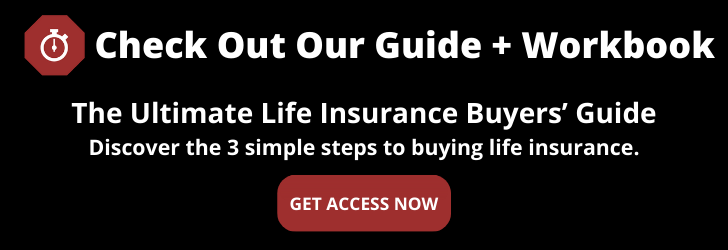05 Sep Grow Your Wealth: Only Buy What You Know

Warren Buffet famously said, “Never invest in a business you cannot understand.”
When it comes to your financial future, a similar mantra should be applied – only buy what you know.
The truth is, the vast majority of Americans are unsure about their financial future. “75% of Americans are only ‘somewhat confident’ or ‘not confident at all’ that they will be financially prepared for retirement,” according to Plan Advisor.
A major reason why so many Americans are worried is that they don’t understand the financial products or investments they are being sold.
In fact, CNBC reports, “63 percent of Americans don’t understand exactly how [a 401(k) plan] works.”
And, according to Motley Fool, “15% of Americans don’t have a policy because they don’t know which kind to get. […] An estimated 12% of Americans don’t have life insurance because they have no idea how much coverage they need.”
In other words, Americans are shopping blind when it comes to financial products or investments for their future.
This opens investors up to a number of risks and puts their financial future in jeopardy.
Instead of being sold financial products you don’t need, you should only buy what you fully understand.
Be An Informed Buyer
If you don’t know or understand your investments, you may miss out on real opportunities to grow your wealth.
Or worse, you may lose money and find your financial future in jeopardy.
Informed buyers only buy financial products and investments that they understand.
They don’t pour money into investments they don’t understand. Even Warren Buffet follows this rule.
U.S. News explains, “Buffett doesn’t seem to have an affinity for the technology business, so he simply avoids it all together. Sure, he misses out on a few big winners like Google and Amazon, but he also doesn’t expose himself or Berkshire investors to the risks associated with investing in something he doesn’t fully understand or appreciate.”
Instead, Buffet invests in companies he feels competent in and fully understands.
When it comes to your financial future, you should follow his advice and only buy what you know.
Don’t simply purchase the first life insurance policy someone tries to sell or merely accept the target date funds your company’s 401(k) plan automatically enrolls you in.
Ask the Right Questions
To become an informed buyer, you need to ask the right questions.
Not asking the right questions (or any questions at all) when meeting an advisor leads to people investing in policies and products they don’t understand.
In my experience as a financial advisor, less than 1% of the thousands of clients I’ve met actually do this.
Don’t be afraid to interview a potential advisor to make sure he or she has your best interest at heart, and never be afraid to ask questions pertaining to your financial future.
If you don’t understand a product or investment, ask enough questions to gain understanding before you agree to it.
For example, do you know the difference between a ROTH and a traditional IRA? Or which one you should invest in?
Asking these types of questions will help you buy what you know.
Check Out This Video and Learn How to Inverview a Finanical Advisor.
Read Your Statements
Another reason people wind up making financial mistakes is that they fail to read their financial statements (or investment statements).
Before you buy or invest in anything, you need to have a clear understanding of where you stand financially at this current time.
Your statements help you see if you are on track with your retirement, investment, or savings goals.
Financial statements empower you to buy what you know so you can improve your financial future.
This can’t happen if you simply enroll in a program and “sit back and relax.”
Understand Your 401(k)
It’s important to understand the ins and outs of your 401(k), so you can maximize your returns.
According to CNBC, “When asked if they understood how a 401(k) plan works, only 37 percent of survey respondents answered yes.”
You want to be one of the 37% who understands how a 401(k) plan works.
Here are some things you need to know about your 401(k):
- The annual contribution limits
- Catch-up contributions limits (if you are over 50 years old)
- Your employee matching contribution and how much you need to contribute to take full advantage of it
- Your plan’s fees
- The rules for withdrawal
- If you were automatically enrolled in target date funds
- Your rollover options (should you leave your job)
- If your plan has a Roth 401(k) component
- The plan’s vesting schedule
Opt In or Out of Target Date Funds
For those with a 401(k), target date funds are often suggested. In some cases, employees are automatically enrolled in a TDF when they sign up for their 401(k) plan.
While there are advantages to having a target date fund, it’s unwise to simply go along with one if you don’t understand it.
A target date fund is a fund offered by an investment company that’s structured to meet capital needed at some date in the future, such as retirement. The asset allocation of a target date fund is based on a predetermined retirement date.
Target date funds are structured to automatically reallocate as you move through different life stages.
What many people don’t realize is that target date funds only take the expected retirement date into account – location, profession, salary, risk tolerance, and retirement goals are not considered.
It’s a one-size-fits-all model.
But what if you don’t fit into one-size-fits-all?
Know What Mutual Funds Are
Another popular financial product people buy into without understanding is mutual funds.
A mutual fund is a basket of investment companies chosen based on the fund objective.
An investment in a mutual fund is an investment in possibly hundreds of companies and is most often actively managed by fund managers.
Before you invest in a mutual fund, you must learn as much as you can about the fund itself.
Here are some questions to ask:
- What are the mutual fund’s investment objectives and goals (e.g., capital gains)?
- What securities does the fund invest in?
- Who is managing the fund?
- What type of investment strategy does the fund use?
- What are the risks of investing?
- What are the fees?
- How has the fund performed in the past
- How will it affect taxes
- Which share class is right for me?
Annuity Considerations
Many people buy annuities when they do not know much about them.
Annuities are a contract between you and an insurance company. After paying for an annuity, you receive payments from your insurance company, providing you with income for the rest of your life.
While annuities may be a great fit for some, they don’t make much sense for others.
For example, if you have enough money to meet your retirement needs, an annuity is unnecessary.
If an annuity seems like a wise choice, there are still some other things you need to consider.
- There are three categories of annuities: fixed, indexed, and variable. It is important to understand the differences between these annuities and identify the one that is best for your financial situation.
- The cost of an annuity differs depending on the type, such as what type of fees are involved.
- Annuities do involve risks, so do some research to determine if the trade-offs are worth it.
Find the Life Insurance That Works for You
Selling life insurance is big business. It’s easy to see why. Life insurance is one of the most important financial products people buy.
Life insurance should be designed to fit the individual and not as a one-size-fits-all financial product.
Unfortunately, insurance agents often push a certain type of life insurance on their clients rather than finding the life insurance that best meets their clients’ needs.
Here’s what insurance agents don’t want you to know…
- They may be getting paid only if they sell that particular life insurance policy.
- There are many types of policies, so you should search until you find the policy that works best for your financial needs.
- There are often discounts available.
- There are exclusions to life insurance, and they vary from one provider to the next. Find out before you sign anything.
- Every year you procrastinate buying life insurance, the more expensive it gets.
- You may be able to get a better rate on your life insurance if your health improves.
Use this information to buy what you know instead of being sold.




Pingback:Create a Retirement Income Plan in 4 Easy Steps - Stop Being Sold
Posted at 15:21h, 20 September[…] order for retirees to thrive, they will need to study their expenses, save, and invest […]